Two photographs of Holocaust survivors taken by Kate Middleton will appear at an exhibition commemorating the 75th anniversary of the liberation of Auschwitz.
By United with Israel Staff
Kate Middleton, the Duchess of Cambridge, released to the public on Monday two portraits she had taken of Holocaust survivors with their grandchildren. The photos will be displayed as part of an exhibition commemorating the 75th anniversary of the liberation of Auschwitz-Birkenau concentration camp next month.
The duchess is a patron of the Royal Photographic Society and considered an excellent photographer. Her husband Prince William has referred to her as “the arty one.”
In a statement, Kate said that reading The Diary of Anne Frank with its “sensitive and intimate” interpretation of the horrors of the Holocaust was one of the “underlying inspirations” for her survivor photographs.
The photo shoot took place in early January at Kensington Palace.
The duchess became acquainted with her subjects for the shoot. She said that despite “unbelievable trauma at the start of their lives,” they were “two of the most life-affirming people,” the Telegraph reported.
“They look back on their experiences with sadness but also with gratitude that they were some of the lucky few to make it through,” she said. “Their stories will stay with me forever. Whilst I have been lucky enough to meet two of the now very few survivors, I recognize not everyone in the future will be able to hear these stories first hand. It is vital that their memories are preserved and passed on to future generations, so that what they went through will never be forgotten.”
Holocaust Survivor Stories
Her subjects, Yvonne Bernstein, 82, and Steven Frank, 84, were photographed with their grandchildren and special items that tell part of their experiences in the Holocaust.
Frank, originally from Amsterdam, was photographed with his granddaughters Maggie Fleet, 15, and Trixie Fleet, 13. The photo includes a pan, kept by his mother through various concentration camps, and a tomato from his garden.
During the Holocaust, his mother managed to gather scraps of bread crumbs, added hot water and made a paste in the pan, on which her sons subsided. “I never saw her eat a spoonful herself,” Frank said, according to the Telegraph. “That food kept us going – the pan was the most important thing she took into the camp.”
While in the Theresienstadt Ghetto, Frank helped a fellow prisoner grow tomatoes from the pips of rotten fruit.
“He showed me how to pick out the side shoots so they grew straight. Then, when he was sent off to a camp in Poland, he asked me to look after his plants. I was so proud to be asked – I was only eight,” he said, the Telegraph reported.
“Since the war I have grown tomatoes at home in the greenhouse and every time I water them I think of this man – I don’t even know his name. I still feel, 75 years on, that I’m watering his tomato plants for him.”
Bernstein, originally from Germany, was hidden in France during most of the Holocaust. She was photographed with her granddaughter, Chloe Wright, 11.
In the photo, she is holding her German ID card, dated March 3, 1939 and stamped with the letter ‘J’ for Jew. A brooch can be seen on the table. It was made at a jewelry firm founded by her great-grandfather that was seized by the Nazis.
The duchess placed her subjects next to a window bringing light from the east, in the direction of Jerusalem, noted the Telegraph.
The project was in collaboration with the Holocaust Memorial Day Trust, Jewish News and the Royal Photographic Society.
Send 'Warm Winter' Care Packages to Israeli Soldiers - They are Cold!
We are honored to thank the young men and women of the IDF who risk their lives every day to defend the citizens of Israel.
Join us in sending winter care packages and personal notes of support to Israeli soldiers who are out in the cold all day.
Warm up a soldier's heart with essential winter wear including fleece jackets. Keep an entire unit warm by ordering 10 packages... The soldiers truly appreciate your love and concern!

